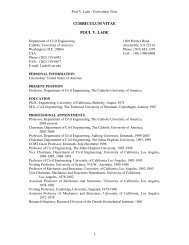Nota Bene-- C:\ARTICLES\TERMIN~1.NB Job 1 - the Catholic ...
Nota Bene-- C:\ARTICLES\TERMIN~1.NB Job 1 - the Catholic ...
Nota Bene-- C:\ARTICLES\TERMIN~1.NB Job 1 - the Catholic ...
You also want an ePaper? Increase the reach of your titles
YUMPU automatically turns print PDFs into web optimized ePapers that Google loves.
Notes<br />
1 For <strong>the</strong> state of <strong>the</strong> research, in addition to <strong>the</strong> commentaries on Romans, see R. Badenas,<br />
Christ The End of <strong>the</strong> Law: Romans 10.4 in Pauline Perspective (JSNTSup 10; Sheffield: JSOT,<br />
1985); C. T. Rhyne, “Nomos Dikaiosynes and <strong>the</strong> Meaning of Romans 10:4,” CBQ 47 (1985)<br />
486-99; W. C. Linss, “Exegesis of Telos in Romans 10.4,” BR 33 (1988) 5-12; B. L. Martin,<br />
Christ and <strong>the</strong> Law in Paul (NovTSup 62; Leiden: Brill, 1989) 129-41; S. R. Bechtler, “Christ,<br />
<strong>the</strong> Τε'λος of <strong>the</strong> Law: The Goal of Romans 10:4,” CBQ 56 (1994) 288-308; A. Gignac, “Le<br />
Christ, τε'λος de la Loi (Rm 10,4), continuité et discontinuité face à l’élection,” ScEs 46 (1994)<br />
55-81; L. Kundert, “Christus als Inkorporation der Tora: τε'λος γα` ρ νο' µου χριστο` ς Röm 10,4 vor<br />
dem Hintergrund einer erstaunlichen rabbinischen Argumentation,” TZ 55 (1999) 76-89.<br />
2 A third meaning of “last part, conclusion, last act (of a drama)” is mentioned but<br />
dismissed as irrelevant by J. A. Fitzmyer, Romans: A New Translation with Introduction and<br />
Commentary (AB 33; New York: Doubleday, 1993) 584. He also points out <strong>the</strong> contradiction of<br />
maintaining that τε'λος can mean both termination and goal in 10:4; he opts, however, for <strong>the</strong><br />
meaning of goal. A unique combination of both senses--termination and goal--is offered by B.<br />
Byrne, Romans (SP 6; Collegeville: Liturgical Press, 1996) 315. He translates, “For Christ is <strong>the</strong><br />
(true) goal of <strong>the</strong> law,” but states: “The translation attempts to bring out <strong>the</strong> sense that <strong>the</strong> law<br />
had no o<strong>the</strong>r purpose than to lead to Christ and <strong>the</strong> righteousness of God available to believers in<br />
him...If, as argued here, <strong>the</strong> telos of <strong>the</strong> law is Christ in <strong>the</strong> sense that <strong>the</strong> law’s purpose has been<br />
to ‘concentrate’ sin to <strong>the</strong> point where God can deal with it in Christ [cf. 7:13], <strong>the</strong>n, of course,<br />
<strong>the</strong> sense of ‘termination’ is implicit. The ‘purpose’ in question is a thoroughly negative one.”<br />
But this interprets 10:4 too much in terms of 7:13 ra<strong>the</strong>r than from <strong>the</strong> immediate context.<br />
3 E.g., in addition to 10:4 τε'λος occurs in only two o<strong>the</strong>r places in Romans with quite<br />
different meanings in accord with <strong>the</strong> context. In 6:21-22 it is best translated as “final result”:<br />
“But what benefit did you gain from <strong>the</strong> things of which you are now ashamed? For <strong>the</strong> final<br />
result (τε'λος) of <strong>the</strong>m is death. But now that you have been freed from sin and have been<br />
15
















